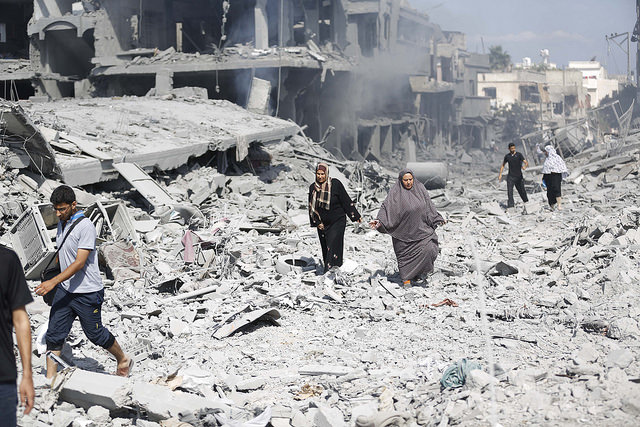by Mitchell Plitnick
Israel and Hamas have agreed to another ceasefire, and there seems to be some sense that this one will last. The terms of the agreement leave many issues up in the air, which tends to work strongly in Israel’s favor. It’s worthwhile to look at who might have won and lost, under the assumption that this ceasefire will actually hold.
The tragic reality after fifty days of bombings, rockets and ground invasions is that neither Israel nor Hamas comes out of this with gains. Israel has gained a ceasefire, but at this point, they have nothing else to show for their efforts. Hamas has gained another episode where they were able to survive Israel’s onslaught, but at the cost of thousands of lives and the destruction of infrastructure that, even for Gaza, is unprecedented. Both sides are looking toward the extended peace talks that are supposed to take place within a month, but counting on such things is often a frivolous effort in the Middle East.
Benjamin Netanyahu
Whatever arguments might be made for the proposition that Israel won this conflict, they cannot apply to the prime minister. Benjamin Netanyahu’s approval ratings can make one seasick: they rose to over 80% at the end of July only to fall to 36% now. While people in Gaza are celebrating the end of the ceasefire, Israelis are relieved but wondering what it was all for.
Netanyahu does not relish this sort of military operation and one can see why. He doesn’t handle them well, as evidenced by the constant shifting of his goals. He started with “quiet for quiet,” moved on to harming Hamas and eliminating its tunnels, then to disarming the group, and finally, when those goals were clearly unattainable, he went back to “quiet for quiet,” jumping at an agreement of that nature as quickly as he could.
Netanyahu is now going to face international pressure to seriously engage in peace talks through Egyptian mediation. His preference, and that of his right flank in Israel, will be to stall on such talks, but with the United States and Europe increasing their support for a resolution to the issue of Gaza, Netanyahu will find himself in the middle of a tug o’ war battle. With that same right flank becoming increasingly alienated from and hostile to him, he may be forced to the table.
That table will house yet another massive failure on Bibi’s part. Back in June, he seized upon the murders of three Israelis, lied to the Israeli public when he knew they were dead, whipped the country into a frenzy and started a process in motion that he could not control, which eventually led to the probably unwanted outcome of “Operation Protective Edge.” Bibi’ purpose in all of this was to rend asunder the Palestinian unity government.
Now the United Nations, the European Union, Egypt, Saudi Arabia, and crucially, the United States, are pushing for that same unity government—currently composed of technocrats led by Mahmoud Abbas—to take over in Gaza. This was certainly evident in Secretary of State John Kerry’s words supporting yesterday’s ceasefire announcement.
Speaking about the urgent need to get construction and humanitarian supplies into Gaza Kerry said:
We are also prepared to work with our international partners on a major reconstruction initiative, with appropriate measures in place to ensure that this is for the benefit of the civilian population in Gaza, not Hamas and other terrorist organizations. We look forward to coordinating closely with President Abbas and the Palestinian Authority on these critical efforts
That is a clear statement of support for the current PA to take over Gaza. United Nations Secretary General Ban Ki-Moon was even more clear.
“Gaza must be brought back under one legitimate Palestinian Government adhering to the PLO commitments,” he said. “The blockade of Gaza must end; Israel’s legitimate security concerns must be addressed. The United Nations stands ready to support efforts to address the structural factors of conflict between Israel and Gaza.”
The plan is to circumvent Hamas as the rulers of Gaza, but there is no hint of any further action against them, and they are already part of the new PA. In many ways, this is Netanyahu’s worst nightmare.
Israel
No one in Israel does or should like the way this has turned out. The small radical left opposed the attacks from the beginning. The Zionist left, as represented by Meretz Chairwoman Zehava Gal-On, welcomed the ceasefire but criticized Netanyahu for going to war and ending up where he could have gotten without violence.
The right is furious over the ceasefire, with four of Netanyahu’s cabinet ministers, including key figures on the right, Naftali Bennett and Avigdor Lieberman, publicly stating their opposition. The failure to achieve the disarmament of Hamas or knock the group from its perch atop the ruins of Gaza is widely seen as a failure throughout Israel.
Ha’aretz correspondent Barak Ravid summed it up aptly:
Netanyahu just wanted to return to the status quo that has become a personal ideology, but the reality is that Israel has regressed. That regression is encapsulated in the 69 Israeli fatalities, 2,000 Palestinian fatalities, the bulk of them innocent civilians, thousands of projectiles on the communities in the south, hundreds of missiles on the center of the country, deserted communities, the loss of trust in the IDF and the government among the residents of the south, economic damage amounting to billions and diplomatic and PR damage that is impossible to quantify.
Hamas
Despite its bravado, Hamas hasn’t gained much and has likely lost a lot in this conflict. Much will, of course, depend on whether the planned talks in Cairo ever happen and what, if anything, comes from them. But as things stand now, Hamas is riding a positive wave in Gaza because it has again survived an Israeli onslaught. But beneath that euphoria is a bitter reality.
The devastation wrought in Gaza is well beyond Hamas’ rebuilding means. This raises a question that I have brought up before: Will Hamas be willing to let the PA run Gaza? They should, but giving up power, even in so meager a sphere as an occupied territory, is never easy.
Hamas will not be able to pay salaries, an issue that was dogging them long before this cataclysm, and in fact, was a major reason they agreed to the unity government in the first place. They will need international assistance and lots of it, and that is only going to come through the PA.
But there is a great deal of anger among Palestinians toward Mahmoud Abbas over his behavior during this crisis. While Hamas leader Khaled Meshal has been recently meeting with Abbas to come to an agreement on a ceasefire, the leadership in Gaza, battered and bruised, may find themselves less able to stomach Abbas, who continued security cooperation with Israel during this crisis, than the considerably more acceptable Meshal.
Still, the PA doesn’t exclude Hamas specifically. It’s currently a technocratic government led by Abbas, pending new elections. But will those elections ever happen and, when and if they do, can Hamas trust that it will be allowed to compete fairly and fully? It was allowed to do so in 2006, but when it won, the United States and Israel immediately moved to undermine the election results, even backing a Fatah coup attempt. So, on the one hand, that’s a lot of trust to expect from Hamas, but on the other, that is also what it agreed to risk when it signed on to the unity government. The choice rests with Hamas.
The Biggest Losers
As always, it is the people of Gaza who, whether the Palestinian cause is aided or not, always endure the brunt of these conflicts. With over 2,100 dead and many thousands injured, infrastructure further battered, and tens of thousands of structures and homes destroyed, the suffering of these people is almost unimaginable. It may well be that they will end up with a much more open border, and that will matter. But the shattered families, the death and destruction, and the scars from all of this violence are going to haunt Gaza, and Israel, for many years.
There’s another big loser here, and it is, as cliché as it may sound, peace. Once again, Israel has demonstrated to the Palestinians that force is the language in which it speaks and the only one it understands. Even the marginal, immediate gains for Gaza—the easing of movement for humanitarian and construction supplies, and according to many reports, the extension of the zone in which Gazans can fish to six miles—were won by aggression, not diplomacy. For comparison, Palestinians can look at what two decades of negotiations got Abbas—lots of settlements.
Many in Israel, even some among the moderate right, understand that this is what Israel has communicated. Unfortunately, that understanding does not extend to Netanyahu, who drones on and on about how he has “hurt” Hamas.
In the end, there may be some good that comes out of this for the Palestinians, though as always, the hope is a thin one and the price is terribly high. But nothing at all here bodes well for Israel.
During a brief 12 hour cessation of hostilities, families returned to Shujaiya on July 27 in eastern Gaza, scene of some of the heaviest Israeli bombing. Credit: Iyad al Baba/Oxfam






As you say Mr Plitnick, time will tell. As far as the outside nations go, the “let’s rebuild” talk, will probably be just that, as in the past, said out of “guilt”, for having either sat by while Israel blew up the infrastructure, but has refused the rebuilding, especially the U.S., which not only supplies the war making instruments, but also resupplies both during and afterward. Take away the help from the U.S., then perhaps a real peaceful solution between the two peoples could be achieved. Putting the egos of the politicians aside, the mental stress that the youth of both sides have endured, doesn’t bode well for a good outcome, especially for the Palestinians. A sober prognosis: “don’t hold your breath”.
The real winners are the Money Men who made enormous profits from the supply of weapons and stand to make more from reconstruction materials and contracts. It wouldn’t surprise me if some of the money from both ended up in the same bank accounts.
Yes .. the report covered a lot however .. Israel knoew that they are targeting kids and schools and they have continued .. which is naturally happening in all its recent wars ..
Other facts missed that on the Palestinian side and Arab world .. this is the first time the war continued for 50 days without raising the wite flag …
Other fact to keep in mind that now Hamas became a fact on the ground which is the only hope for Palestinians ..
One more example .. Palestinian in west bank didnt participate really in the war however they have vary difficult life caused by Israel ..
As you have noted even Abbas who went for negotiation .. he can travel from Palestine without Israel approval …
On the other hand Netinyahu failed to stop reckets which means he was unrealistic in all plans and actions ..